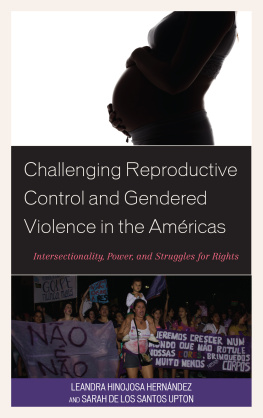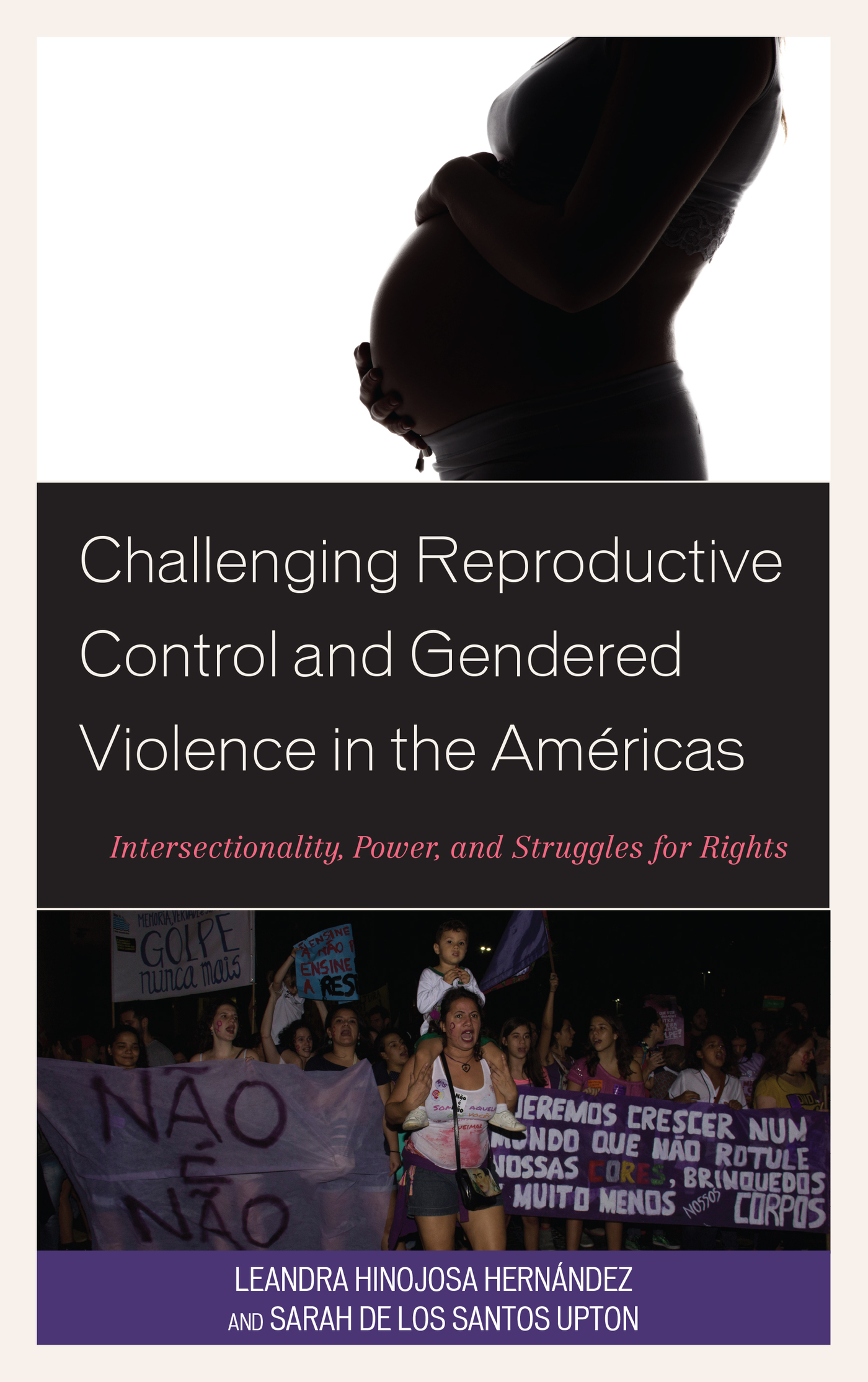Challenging Reproductive Control and Gendered Violence in the Amricas
Lexington Studies in Health Communication
Series Editors: Leandra H. Hernndez and Kari Nixon
National and international governments have recognized the importance of widespread, timely, and effective health communication, as research shows that accurate, patient-centered, and culturally competent health communication can improve patient and community health care outcomes. This interdisciplinary series examines the role of health communication in society and is receptive to manuscripts and edited volumes that use a variety of theoretical, methodological, interdisciplinary, and intersectional approaches. We invite contributions on a variety of health communication topics including but not limited to health communication in a digital age; race, gender, ethnicity, class, physical abilities, and health communication; critical approaches to health communication; feminisms and health communication; LGBTQIA health; interpersonal health communication perspectives; rhetorical approaches to health communication; organizational approaches to health communication; health campaigns, media effects, and health communication; multicultural approaches to health communication; and international health communication. This series is open to contributions from scholars representing communication, womens and gender studies, public health, health education, discursive analyses of medical rhetoric, and other disciplines whose work interrogates and explores these topics. Successful proposals will be accessible to an interdisciplinary audience, advance our understanding of contemporary approaches to health communication, and enrich our conversations about the importance of health communication in todays health landscape.
Recent Titles in This Series
Challenging Reproductive Control and Gendered Violence in the Amricas:
Intersectionality, Power, and Struggles for Rights, by Leandra Hinojosa Hernndez and Sarah De Los Santos Upton
Politics, Propaganda, and Public Health: A Case Study in Health Communication
and Public Trust, by Laura Crosswell and Lance Porter
Communication and Feminist Perspectives on Ovarian Cancer, by Dinah Tetteh
Challenging Reproductive Control and Gendered Violence in the Amricas
Intersectionality, Power,
and Struggles for Rights
Leandra Hinojosa Hernndez
and Sarah De Los Santos Upton
LEXINGTON BOOKS
Lanham Boulder New York London
Published by Lexington Books
An imprint of The Rowman & Littlefield Publishing Group, Inc.
4501 Forbes Boulevard, Suite 200, Lanham, Maryland 20706
www.rowman.com
Unit A, Whitacre Mews, 26-34 Stannary Street, London SE11 4AB
Copyright 2018 by The Rowman & Littlefield Publishing Group, Inc.
All rights reserved. No part of this book may be reproduced in any form or by any electronic or mechanical means, including information storage and retrieval systems, without written permission from the publisher, except by a reviewer who may quote passages in a review.
British Library Cataloguing in Publication Information Available
Library of Congress Cataloging-in-Publication Data
Names: Hernndez, Leandra Hinojosa, author. | Upton, Sarah De Los Santos, author.
Title: Challenging reproductive control and gendered violence in the Americas : intersectionality, power, and struggles for rights / Leandra Hinojosa Hernndez and Sarah De Los Santos Upton.
Description: Lanham : Lexington Books, [2018] | Series: Lexington studies in health communication | Includes bibliographical references and index.
Identifiers: LCCN 2018009704 (print) | LCCN 2018007784 (ebook) | ISBN 9781498542586 (Electronic) | ISBN 9781498542579 (cloth : alk. paper)
Subjects: LCSH: Reproductive rights--America. | Women--Violence against--America. | Feminism--America.
Classification: LCC HQ766 (print) | LCC HQ766 .H47 2018 (ebook) | DDC 363.9/6097--dc23
LC record available at https://lccn.loc.gov/2018009704
 TM The paper used in this publication meets the minimum requirements of American National Standard for Information Sciences Permanence of Paper for Printed Library Materials, ANSI/NISO Z39.48-1992.
TM The paper used in this publication meets the minimum requirements of American National Standard for Information Sciences Permanence of Paper for Printed Library Materials, ANSI/NISO Z39.48-1992.
Printed in the United States of America
This book is dedicated to our mothers
Ernestine and Dalia
And to our grandmothers
Maria del Pilar, Beatriz, Marilynn, and Isabel
Who have served as our primary models for what it
means to be strong mothers and strong feminists
Acknowledgments
In her foundational book on abortion rhetoric, Celeste Michelle Condit (1990) began her preface with the statement, Unlike so many books these days, this work was not supported by foundations or time off from teaching or other outside aid. As a consequence, the extra effort had to come out of the lives of my friends, colleagues, and family (p. ix). Similarly, we completed this book with no grants or awards, no research assistance stipends, and no course releases. As such, this book was a labor of love. The age-old saying It takes a village to raise a child encapsulated our writing process, as it did indeed take a village of support and love to facilitate the completion of this book project amidst unexpected twists and turns at every stage of the writing process. Before we discuss our individual acknowledgments, we would like to thank Nicolette Amstutz, our editor at Lexington Books, and the editorial staff for their valuable assistance and support throughout this process. We would also like to thank Dr. Michelle Holling for her detailed and supportive feedback on earlier versions of chapters 4 and 5, which were presented at the 2017 National Communication Association conference. Finally, we extend our deepest gratitude to our anonymous manuscript reviewer for their thorough comments, which strengthened our argument and our vision for the book.
Leandra
This book would have been impossible to complete without the support of my mentors, colleagues, friends, and family members. First, I would like to thank Drs. Martha Haun and Jill Yamasaki of the University of Houston for their continued support during my masters program and for assistance in the construction of the foundation for my future career, scholarship, and research interests. Second, I would like to thank my doctoral committee members at Texas A&M University for fostering many of the feminist and reproductive health ideas that served as the inspiration for this book. Drs. Richard L. Street, Jr., Tasha Dubriwny, Antonio La Pastina, and Joan Wolf, thank you for your continued support and friendship, even when I struggled to reconcile my interests in patient-provider communication, womens health, and feminist studies. (Its all so clear now.) Third, I would like to thank my dear friends and colleagues who provided continuous and valuable support in writing groups, coffee outings, and hiking/climbing trips. Brianna Codallos, Renee Hudson, Stephanie Gomez Menzies, and Marcella Rojas, thank you for your enlightening conversations, your friendship, and for keeping the good fight alive. Fourth, I would like to thank Sarah, my coauthor, for being the silver lining to my grey cloud and my blessing in disguise. Working with you on this book project has been so rewarding. Thank you for your friendship, your support, your sisterhood, and for being my work wife, especially when I asked you to join this book project near the end due to unforeseen circumstances, which changed the entire direction of the book (for the better).








 TM The paper used in this publication meets the minimum requirements of American National Standard for Information Sciences Permanence of Paper for Printed Library Materials, ANSI/NISO Z39.48-1992.
TM The paper used in this publication meets the minimum requirements of American National Standard for Information Sciences Permanence of Paper for Printed Library Materials, ANSI/NISO Z39.48-1992.